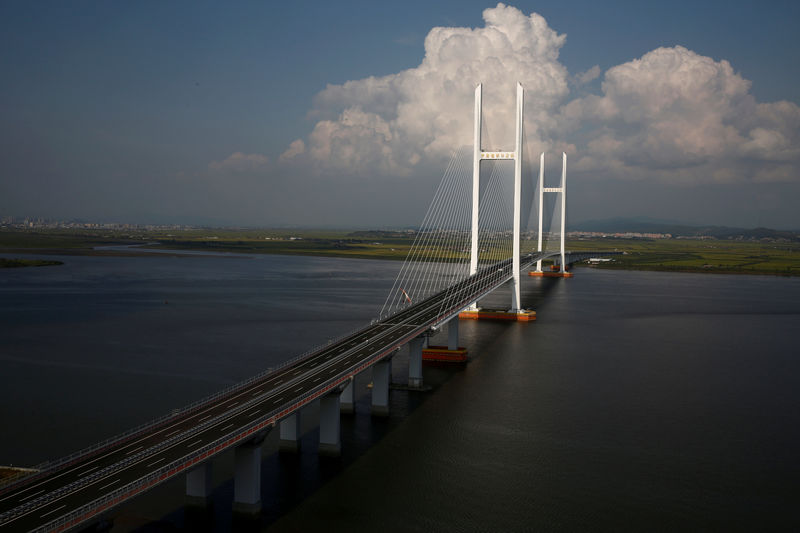By Benjamin Kang Lim and Michelle Nichols
BEIJING/UNITED NATIONS (Reuters) - China is in a bind over what to do about North Korea's stepped-up nuclear and missile tests, even though it is annoyed with its ally and has started talks with other U.N. Security Council members on a new sanctions resolution against Pyongyang.
China shares a long land border with North Korea and is seen as the only country with real power to bring about change in the isolated and belligerent nation. However, Beijing fears strengthening sanctions could lead to collapse in North Korea, and it also believes the United States and its ally South Korea share responsibility for growing tensions in the region.
China is in a difficult spot, a source close to the Chinese leadership told Reuters when asked if Beijing's attitude to North Korea had changed after its fifth nuclear test last week.
"On the one hand, China is resolutely opposed to North Korea developing nuclear weapons for fear of triggering a nuclear arms race in the region," the source said, referring to Japan and South Korea following in Pyongyang's footsteps.
"On the other hand, North Korea is a big headache but regime change is not an option," the source added. "Collapse of the regime would lead to chaos in (China's) northeast" bordering North Korea, the source said, requesting anonymity.
The prospect of a unified Korea under Seoul's leadership and the possibility of U.S. troops on China's borders has long been a nightmare for Beijing.
A collapse in North Korea, sending a flood of refugees across the relatively porous border into China's rustbelt northeastern provinces, would also be deeply destabilizing to Beijing's rule as well as a huge economic cost.
Those concerns have been around for years, but now Beijing is also deeply angered by a U.S. decision to deploy an advanced anti-missile system in South Korea, the Terminal High Altitude Area Defense (THAAD) system. It has said its own security has been compromised and that North Korea's recent belligerence is due to this deployment.
Publicly, China has not linked the THAAD deployment with whether it will support sanctions on North Korea. It condemned the latest missile and nuclear tests but said sanctions alone could not resolve the issue and has called for a resumption of talks with Pyongyang.
Beijing has also said it will work within the United Nations to formulate a necessary response to its fifth nuclear test.
"We're in negotiations on a U.N. Security Council resolution," Samantha Power, the U.S. ambassador to the United Nations, said on Thursday.
Diplomats said the talks were at an early stage and negotiations were likely to be long and tough.
IRRITATION AND CONSENSUS
One senior U.N. diplomat said Beijing made displeasure with Pyongyang clear at an earlier Security Council meeting called after North Korea tested three medium range missiles at an embarrassing time - when U.S. President Barack Obama and other world leaders were gathered for the G20 summit in the eastern Chinese city of Hangzhou this month.
"The tone of the whole discussion was much more consensual, it didn't feel like there was two camps fighting arguing with each other," said the diplomat. "Of course there continue to be different views about sanctions."
The United States has called on Beijing to use its influence to get North Korea to give up its nuclear ambitions, and to close sanctions "loopholes", since the existing ones had done little to prevent Pyongyang from pursuing its nuclear and missile programs.
Shen Wenhui, a researcher at the Chinese Academy of Social Sciences, told influential state-run newspaper the Global Times last week that crippling sanctions would cause a "humanitarian disaster" in North Korea.
"In putting sanctions on North Korea, the international community must reduce the effect on ordinary people to the greatest possible extent," Shen wrote.
China's concerns also include the larger issue of what Beijing sees as Washington's attempts to surround it under Obama's strategic "rebalance" towards Asia. Besides THAAD, the dispute in the South China Sea, cybersecurity and human rights have marred ties between the world's two biggest economies.
Chinese officials also say that the West over-estimates its influence with North Korea.
"I think any idea to ask North Korea to abandon nuclear weapons would fail, and any idea to ask South Korea to abandon THAAD would fail," said Shen Dingli, a professor at Shanghai's elite Fudan University and director of the school's Program on Arms Control and Regional Security.
North Korea is useful for China, Shen added. "China needs North Korea to counter the United States."
In Seoul, some are already accepting that China will not do much more to punish North Korea.

"The sanctions that North Korea will not be able to endure will be all blocked by China even without being asked by the North," Chun Yung-woo, a former South Korean national security adviser, told Reuters. "So the North is hiding behind that and comfortably pursuing the nuclear programmer's."